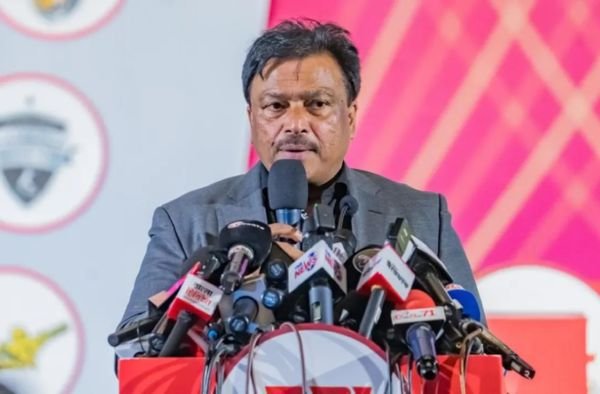The Bangladesh Cricket Board (BCB) is currently engulfed in controversy as its president, Faruque Ahmed, openly refuses to step down despite a direct request from the national government. This standoff has intensified tensions within Bangladesh cricket, with mounting allegations against Faruque’s leadership and growing calls for his removal.

Government’s Request and Faruque’s Defiant Response
On May 28, 2025, Faruque Ahmed revealed that the government’s Youth and Sports Ministry, through adviser Asif Mahmud Shojib Bhuiyan, had asked him to resign from his position as BCB president. The request comes less than nine months after Faruque assumed office on August 21, 2024.
However, Faruque has made it clear that he will not resign voluntarily. Speaking to the media, he said:
“The adviser hasn’t told me to resign directly but said they don’t want me to continue. I am an elected board president, and I will not resign.”
This firm stance highlights a brewing power struggle between the BCB leadership and the government, with Faruque asserting his legitimacy based on the electoral process within the board.
Why Is Faruque Under Pressure?
Faruque’s tenure has been marred by multiple controversies and criticisms, including:
Poor Management of Domestic Cricket: Several domestic tournaments, including the Dhaka Premier League and Bangladesh Premier League, have been plagued by allegations of mismanagement and corruption.
Financial Irregularities: Accusations of awarding contracts without transparent tender processes and links to questionable figures have surfaced.
National Team Performance: Bangladesh’s inconsistent performances and fall to 10th in the ICC rankings have added to the dissatisfaction.
Administrative Chaos: The handling of coaching appointments, disciplinary actions, and internal board conflicts have raised questions about governance.
No-Confidence Motion: Several BCB directors have filed a formal no-confidence motion accusing Faruque of autocratic leadership, constitutional violations, and financial mismanagement.
These factors have combined to erode confidence in Faruque’s leadership both inside and outside the cricketing fraternity.
Potential Consequences and ICC Concerns
If Faruque refuses to resign, the government faces a dilemma. Forcing him out without his consent could be viewed as government interference in cricket administration, violating the International Cricket Council’s (ICC) code of ethics. The ICC has previously sanctioned boards like Sri Lanka and Zimbabwe for similar interventions.
Meanwhile, former Bangladesh captain Aminul Islam is widely tipped as the frontrunner to replace Faruque. Aminul, currently an ICC development officer, is expected to request a notice period before assuming the presidency, likely following the upcoming board elections in October.
What Does This Mean for Bangladesh Cricket?
The ongoing leadership crisis threatens to overshadow Bangladesh cricket’s progress. Key concerns include:
Stalled Reforms: Faruque had promised accountability and transparency, but critics say the board has regressed into old patterns of dysfunction.
Player Unrest: Incidents like the suspension saga involving Towhid Hridoy and player protests have exposed cracks in discipline and management.
Financial Instability: Failure to secure broadcast rights and allegations of financial impropriety risk the board’s financial health.
Loss of Credibility: The BCB’s reputation is at stake, both domestically and internationally.
Key Takeaways
- Faruque Ahmed refuses to resign despite government advice, citing his elected status.
- His presidency faces serious allegations of mismanagement, corruption, and autocratic behavior.
- A no-confidence motion has been filed by multiple BCB directors.
- Forcing Faruque out could lead to ICC sanctions due to government interference.
- Former captain Aminul Islam is the likely successor after upcoming elections.
FAQs
1. Why has the government asked Faruque Ahmed to step down as BCB president?
Due to allegations of poor management, financial irregularities, and declining national team performance, the government has requested Faruque’s resignation.
2. Has Faruque Ahmed agreed to resign?
No, Faruque has refused to resign, stating he is an elected president and will continue in his role.
3. What are the risks if Faruque is forcibly removed?
Forced removal could be seen as government interference, risking sanctions from the International Cricket Council (ICC).
4. Who is expected to replace Faruque Ahmed?
Former Bangladesh captain Aminul Islam is the leading candidate to succeed Faruque after board elections.
5. How has Faruque’s tenure impacted Bangladesh cricket?
His tenure has been marked by controversies, administrative chaos, financial concerns, and poor team performances, leading to widespread criticism.
Conclusion
The Bangladesh Cricket Board finds itself at a critical crossroads as Faruque Ahmed refuses to step down amid mounting pressure. This standoff highlights the complex interplay between governance, politics, and cricket administration in Bangladesh. As the cricketing community watches closely, the resolution of this crisis will be pivotal in shaping the future of Bangladesh cricket—whether it leads to reform and stability or further turmoil remains to be seen.